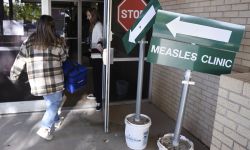Michigan expert depressed by COVID vaccine myths, government rollout

The man in charge of the committee that helped clear the way for federal approval of two COVID vaccines admits to getting “really depressed” these days about the hope that these vaccines promised.
It’s not that Dr. Arnold Monto, of the University of Michigan, doesn’t believe in the safety and efficacy of the vaccines — not at all.
But the rollout? That thousands of health care workers are turning down the vaccine? The misinformation? Conspiracy theories?
Monto, who in December led the U.S. Vaccines and Related Biological Products Advisory Committee that assessed the safety of the Moderna and Pfizer vaccines for COVID-19, spoke to Bridge Michigan to answer questions raised about the vaccines:
Will the COVID vaccines cause infertility?
Monto is blunt: “That’s the same kind of drivel that comes out with every vaccine.”
The epidemiologist, whose career spans six decades and for whom the U.S. Centers for Disease Control and Prevention has named a research award, should know. He’s seen misinformation circulate for years about vaccines, and it often involves infertility, he said.
Related stories:
- Michigan: 90 percent need COVID vaccine for herd immunity. That’s unlikely.
- Michigan makes gains on COVID vaccines at nursing homes; other seniors wait
- Not if, but when: Michigan on lookout for faster-moving COVID variant
- Thousands of Michigan health workers are turning down COVID vaccines
- Six things to know about the safety of the leading COVID vaccines
Political and religious leaders in northern Nigeria, for example, effectively halted an immunization campaign against polio in 2003, arguing that the vaccine contained antifertility agents as well as ingredients that would lead to cancer and HIV. Such conspiracy theories about "genocide" and forced infertility aren't new, Monto said.
Still, when it comes to COVID vaccines, even those unlikely to circulate social media myths might worry in the absence of credible information.
Pfizer and Moderna excluded pregnant women from their trials, a typical exclusion in drug trial protocols. That means there is scarce safety data among those groups.
But given that pregnant women are at elevated risk of severe illness or death if they contract COVID, the CDC, the American College of Obstetricians and Gynecologists and the Society for Maternal-Fetal Medicine all say pregnant and breastfeeding people should not be excluded from vaccinations if they are otherwise eligible, though they recommend consulting a doctor about any concerns.
The World Health Organization does not recommend the Pfizer vaccine for pregnant or lactating women “at this time,” citing “insufficient data.”
Monto and others note that an mRNA vaccine simply doesn't work in a way that would affect a fetus or breast milk. These vaccines don’t carry the virus; rather they carry the code that builds proteins like the now-infamous spike protein that allows the coronavirus to latch onto and invade cells. The body’s defenses quickly “remember” the coding, then destroy the mRNA.
“There’s not even a shred of biologic data to suggest [the vaccines would cause infertility]. It doesn’t make sense. It’s not how the vaccine works,” Monto said.

Will the vaccine work against the new, more contagious variants of COVID-19?
“We think they will work. The question is ‘How well will they work?’” Monto said.
Mutations of the coronavirus are expected, and they don’t render the vaccines useless; rather, a COVID vaccine may require it to be periodically tweaked to match newer mutations, much like the annual flu vaccine is altered from year to year.
The influenza virus also constantly mutates, so researchers each year use models to try to predict which strains will be the most likely to circulate and match the vaccines to them. The flu vaccines are never a “perfect fit,” but they provide varying degrees of protection each year both individually and for building herd immunity.
In clinical trials, the Moderna and Pfizer vaccines showed a 94 percent to 95 percent efficacy against COVID-19. In contrast, the effectiveness of flu vaccines vary each year.
Additionally, there are early indications the Pfizer vaccine also neutralizes the B.1.1.7. variant (first detected in the United Kingdom) that, as of Monday, had been detected in at least 17 people in Michigan. The vaccine may need to be "updated periodically to avoid potential loss of clinical efficacy," the drug company researchers wrote.
On Monday, Moderna announced its early results from early studies that suggest it, too, is effective against both the B.1.17. strain from the U.K. as well as another variant first detected in South Africa.
In short, Monto believes that mutations may tamp down the efficacy of vaccines, but the groundwork or “platform," like the influenza vaccines, is now established. "Tweaking the mRNA is relatively easy," he said.
On the U.S. vaccine rollout so far?
“I’m getting really depressed about the vaccine problem … the insufficient supply" and the "hit or miss" problems in distribution and administration, Monto said.
The U.S.-approved vaccines were developed in less than a year under Operation Warp Speed, and Monto and others held marathon meetings to vet the drug companies’ safety data. But getting vaccines distributed and into people’s arms has been slow.
But Monto stopped short of placing the blame on a single person, administration, or company for the frustrations faced by many in Michigan and across the country as they seek appointments for a vaccine.
“I think the biggest problem right now is the supply. If we had more supply, I think we could figure out what to do with added resources which can be mobilized.”
Are additional vaccines on the horizon?
“Public information suggests (the) end of February,” Monto said.
The United Kingdom has approved a vaccine by AstraZeneca, but the company has not asked for approval in the United States yet, likely because some of the early data was “muddy,” Monto said.
Monto said a vaccine by Johnson & Johnson is most likely the next up.
Like Pfizer and Moderna, Johnson & Johnson has angled its attack at the spike protein of the coronavirus. It is this spike protein that allows the coronavirus to latch on and invade cells.
But the Johnson & Johnson vaccine works differently than an mRNA vaccine, which uses only a small piece of genetic material to give instructions to the body to build defenses.
Johnson & Johnson's vaccine contains a genetically engineered adenovirus — a common virus that has been outfitted with specific instructions. Once this adenovirus enters the body, its entire DNA is absorbed into the nuclei of healthy cells which, in turn, instruct healthy cells to replicate, but with new spike proteins similar to those found on the coronavirus. Recognizing those new spikes as foreign, the body then mounts a defense to destroy the spiked cells and, in doing so, stores the memory so that the immune system recognizes future invaders with a similar spike protein, including a coronavirus.
The Johnson & Johnson vaccine has triggered side effects similar to other vaccines — mostly mild or moderate fever, headache fatigue and a sore arm. But in early results, the drugmaker’s trial found that more than 90 percent of participants developed antibodies to COVID-19 after being vaccinated.
Larger results from Phase 3, begun in September, have not yet been published.
See what new members are saying about why they donated to Bridge Michigan:
- “In order for this information to be accurate and unbiased it must be underwritten by its readers, not by special interests.” - Larry S.
- “Not many other media sources report on the topics Bridge does.” - Susan B.
- “Your journalism is outstanding and rare these days.” - Mark S.
If you want to ensure the future of nonpartisan, nonprofit Michigan journalism, please become a member today. You, too, will be asked why you donated and maybe we'll feature your quote next time!








